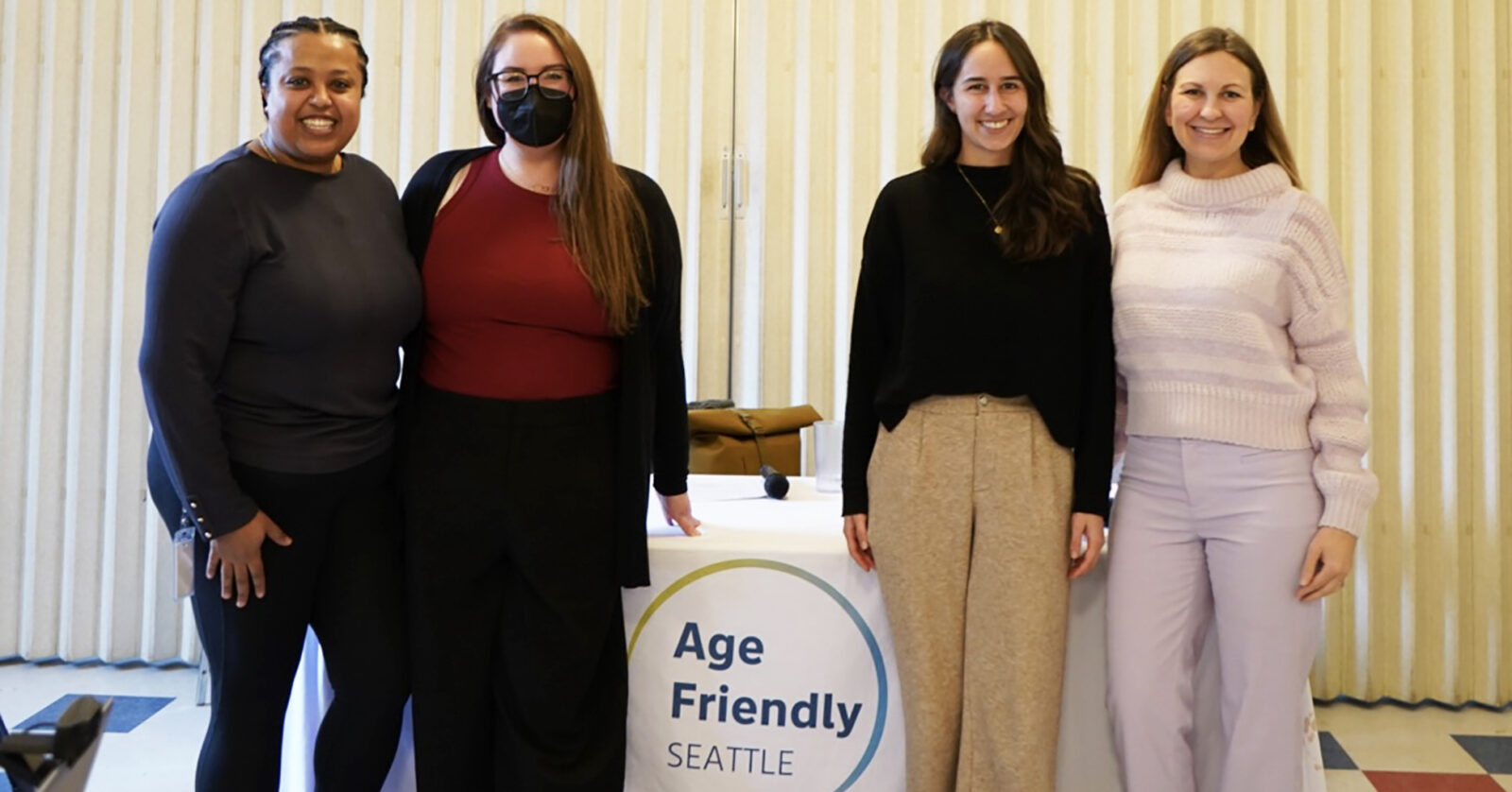Civic Coffee Recap: Exploring Alternative Therapies

On January 24, Age Friendly Seattle kicked off the new year with the first Civic Coffee of 2024, in collaboration with the Wallingford Senior Center. Panelists Evelyn Stagnaro (Board Certified Music Therapist, and founder and executive director of Life on Music) and Jael Weinberg (art therapist and a licensed mental health counselor, founder and co-founder of Art Therapy PNW and Creative Collective) discussed the healing potential of alternative therapies like music and art therapy.
Life on Music is a private practice that offers music therapy and adaptive music lessons for people of all ages. Their music therapy sessions for older adults are designed to meet the needs of every individual and the sessions can be in a group or one-on-one setting with a board-certified music therapist.
Art Therapy PNW offers individual art therapy sessions for people of all ages and individuals with dementia. One of Jael’s services for individuals with dementia is legacy work which utilizes art therapy to create legacy projects to share and preserve every individual’s unique story with the people they love.
The Creative Dementia Collective serves people living with dementia, and their loved ones, with various services, including music therapy and art therapy to express themselves while also strengthening their cognitive skills. Their team also offers educational opportunities to develop dementia awareness among people living with dementia and their support systems.
Music therapy is a personalized form of therapy that begins with assessing a client to develop a plan of care with recommendations for goals with input from the individual, their families, caregivers, and other health care professionals. For people with cognitive impairments, participating in music therapy can be a way of using music for short-term and long-term memory recall.
Art therapy is an alternative to psychotherapy where instead of talking, patients engage in creating artwork with a therapist to process and express their emotions and thoughts. Art therapy can be through various mediums like drawing, painting, or sculpting which allows people to create an art piece for self-expression. Jael shared a common misconception about art therapy is that people must have artistic skills to enjoy or benefit from art therapy—which is untrue, all people regardless of artistic skills can participate.
Evelyn mentioned that music therapy offers various physical health benefits; singing helps with breath support and articulation or playing an instrument engages fine motor skills which are needed for daily tasks like holding a pencil or tying shoelaces. Music therapy also promotes functional mobility by engaging the patients’ whole body through playing various kinds of instruments.
A key benefit of self-expression through art therapy is that it doesn’t require talking to communicate effectively. Through visual art, emotions and thoughts can be expressed all at once through a drawing or sculpture which can also be saved to look back on in the future. This can be beneficial for older adults or people living with dementia because expressing themselves through words may be a challenge but through art it allows people to connect with themselves and release certain emotions or thoughts.
Evelyn shared that cultural inclusivity is a crucial part of her work as a music therapist because not only does it benefit the patient because they are listening to the music that they enjoy but it also creates a safe environment for people to express their cultures and languages in their therapy sessions.
Jael mentioned that one of her favorite parts of her job is including her patients’ family members, loved ones, or caregivers in the work she does to create an inclusive and collaborative process for patients and their loved ones. She mentioned that this is especially important in her legacy work so that the legacy projects holistically represent the individual.
Both panelists expressed their love for the work that they do because they are able to support people’s self-expression through music and art while also seeing their patients learn more about themselves after each session.
Age Friendly Seattle appreciated the participation of the Wallingford Senior Center attendees. Thank you to both panelists for the insightful conversation on alternative therapies and to the Wallingford Senior Center for hosting this event.
Couldn’t attend this Civic Coffee? Watch the recording of this event here.
Join us at our next Civic Coffee on Friday, February 23 (1–2 p.m.) at the Ballard NW Senior Center (5429 32nd Ave NW, Seattle, WA 98107) for a discussion on digital navigation. Older adults who live in North Seattle are encouraged to attend.
Stay connected with Age Friendly Seattle to learn about upcoming Civic Coffees and other events in 2024. Visit seattle.gov/agefriendly/programs/events and bookmark Aging King County’s Age Friendly Live—Virtual Events webpage. Also, follow Age Friendly Seattle on Facebook and Twitter. For more information, e-mail agefriendly@seattle.gov.
Photo at top (left to right): Eldad Mekuria, Age Friendly Program Coordinator; Jael Weinberg, Art Therapy PNW and The Creative Dementia Collective; Evelyn Stagnaro, Life on Music; and Dinah Stephens, Age Friendly Program Manager
Age Friendly Seattle Civic Coffees are scheduled every month (except December). Stay connected with Age Friendly Seattle to learn about upcoming Civic Coffees and other events in 2024. Visit seattle.gov/agefriendly/programs/events and bookmark Aging King County’s Age Friendly Live—Virtual Events webpage. Also, follow Age Friendly Seattle on Facebook and Twitter. For more information, e-mail agefriendly@seattle.gov.
 Contributor Fathima Garcia is an intern with Age Friendly Seattle. She is a recent Seattle Central College graduate with an associate degree in business administration. Starting this fall, she will study Human Resources Management at the University of Washington Foster School of Business.
Contributor Fathima Garcia is an intern with Age Friendly Seattle. She is a recent Seattle Central College graduate with an associate degree in business administration. Starting this fall, she will study Human Resources Management at the University of Washington Foster School of Business.
This article appeared in the February 2024 issue of AgeWise King County.
![Aging & Disability Services for Seattle & King County [logo]](https://www.agingkingcounty.org/wp-content/themes/sads/images/seattle-ads-logo.png)
